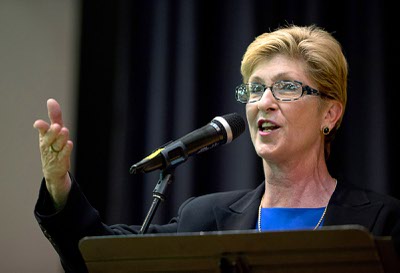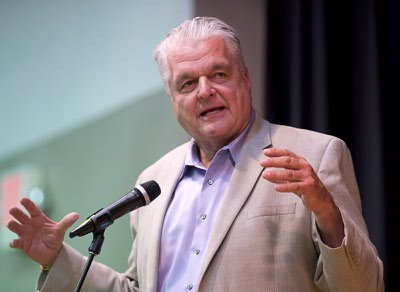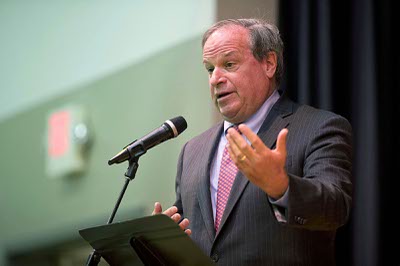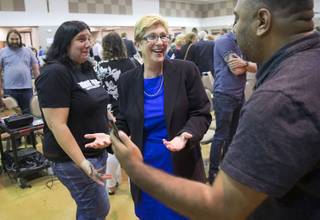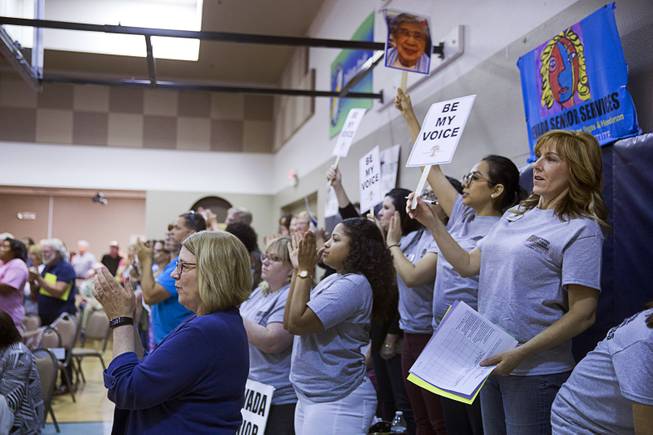
Attendees applaud during a gubernatorial candidates accountability session with Nevadans for the Common Good at Saint Elizabeth Ann Seton Church in Summerlin Tuesday, May 8, 2018.
Tuesday, May 8, 2018 | 11:45 p.m.
Low education funding and the state’s $750 million share of the Raiders stadium cost were key topics at a gubernatorial candidate forum hosted by a group of faith and nonprofit organizations.
Democratic candidates and Clark County Commissioners Chris Giunchigliani and Steve Sisolak split Tuesday night on the value of the state’s portion of the stadium tab. Giunchigliani has criticized the deal at a time when Nevada is struggling to fund education, as has Republican Dan Schwartz, the state’s treasurer who is also vying to replace term-limited Gov. Brian Sandoval.
The candidates discussed the Raiders funding in response to questions from working groups within Nevadans for the Common Good, which hosted the nonpartisan candidate forum. The group is made up of religious and nonprofit organizations, including Opportunity Village, which helps those with disabilities. On ensuring room and marijuana tax revenue go to education, all three candidates said those funds need to go straight to education rather than be funneled elsewhere.
Sisolak said the stadium is projected by conservative estimates to generate 45,000 jobs and $36 million in annual tax revenue. He has pledged that if he’s elected, he’ll donate his governor’s salary until Nevada schools are on track. Sisolak said the state’s investment in the stadium will be paid for by tourists, not residents.
“Clark County owns that stadium,” Sisolak said. “UNLV plays there, the Raiders will play there, and other events will be held there, and they’re putting up $1.2 billion, and we’re putting up $750 million. So it’s a good investment for the community when you look at the number of jobs that are created and the revenue that that’s going to spin off that’s going to be on an annual basis, that goes for education.”
Schwartz said that as governor he’d work to renegotiate the Raiders contract. He said $750 million in public money for a stadium is too much for a state that has flat revenue and ranks last in the nation when it comes to education. The statistics on the benefits on the plan are exaggerated, he said.
“That is $750 million of public money that is going to build a stadium for the benefit of billionaire owners,” he said. “It’s not for us.”
Giunchigliani said the state may not have a legal leg to stand on to renegotiate the Raiders contract. She said not only is the state investing the $750 million, but the Raiders will not pay property tax or live entertainment tax. She said the Clark County School District is facing a $68 million shortfall, Reno is about $30 million, and rural schools are overextended making up for the lack of funding.
“It does need to be talked about,” Giunchigliani said. “It’s not the stadium, it’s the subsidy, and where are our priorities.”
Working groups on health care, education, public transportation, housing and homelessness, and immigration developed questions for the candidates that were given to them ahead of time.
Candidates were asked whether they would protect Medicaid expansion under Obamacare; whether they would ensure room and pot tax revenue goes to public education; whether they would work with Nevadans for the Common Good to improve transportation; what they’ll do to help people find affordable housing; and whether they’d commit to an Oct. 18 meeting before the general election.
The candidates said they’d work to protect health insurance coverage for those who gained it under Obamacare and Sandoval. On transportation, Giunchigliani and Sisolak urged more creative revenue streams so that transportation revenue benefits neighborhoods and not just the Strip.
Schwartz repeatedly asked where the funding for improvements would come from. He said the state could pursue other revenue sources in place of the commerce tax, which passed under Sandoval in an effort to better fund education.
Republican candidate Adam Laxalt was one of the four candidates invited to the forum, according to the group, but did not attend. In response to a request for comment on Laxalt’s decision not to attend, campaign spokesman Andy Matthews said Laxalt has been to every single county and is focused on the primary. He did not answer a question Tuesday about whether Laxalt had a scheduling conflict.
Giunchigliani said Laxalt’s absence was “disrespectful” and Schwartz said it was “appalling.”
“The public has a right to know who we are, whether they agree with us or don’t agree with us,” Giunchigliani said. “You got to show up.”
“This guy wants to be governor of this state,” Schwartz said. “He’s got to answer the tough questions.”
Sisolak said he didn’t know what could have prevented Laxalt from attending.
“It’s incumbent upon the people that are running to try to make themselves available,” Sisolak said.
Early voting for the June 12 primary begins May 26.
